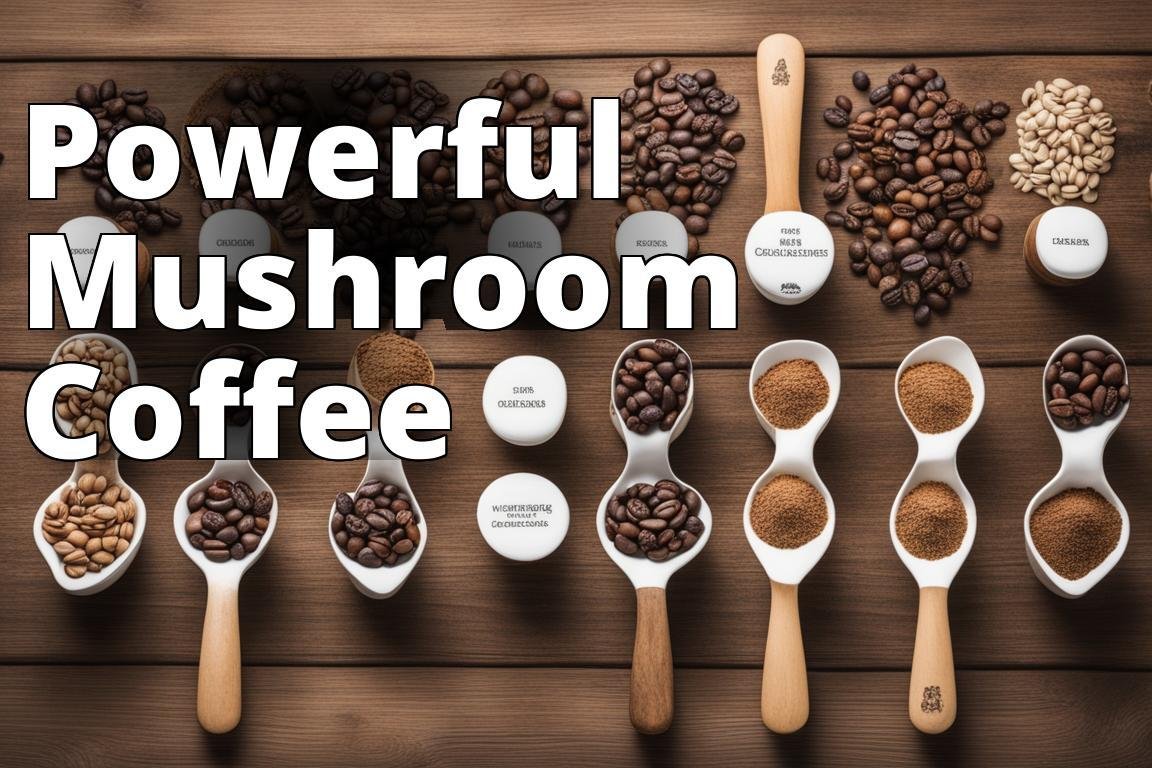Introduction
Brief overview of mushroom coffee
Coffee, that beloved morning (and afternoon, and sometimes even evening) ritual, might be getting a makeover. In recent years, mushroom coffee has emerged as a curious yet intriguing trend. But what exactly is it, and where did this unique coffee concoction come from?
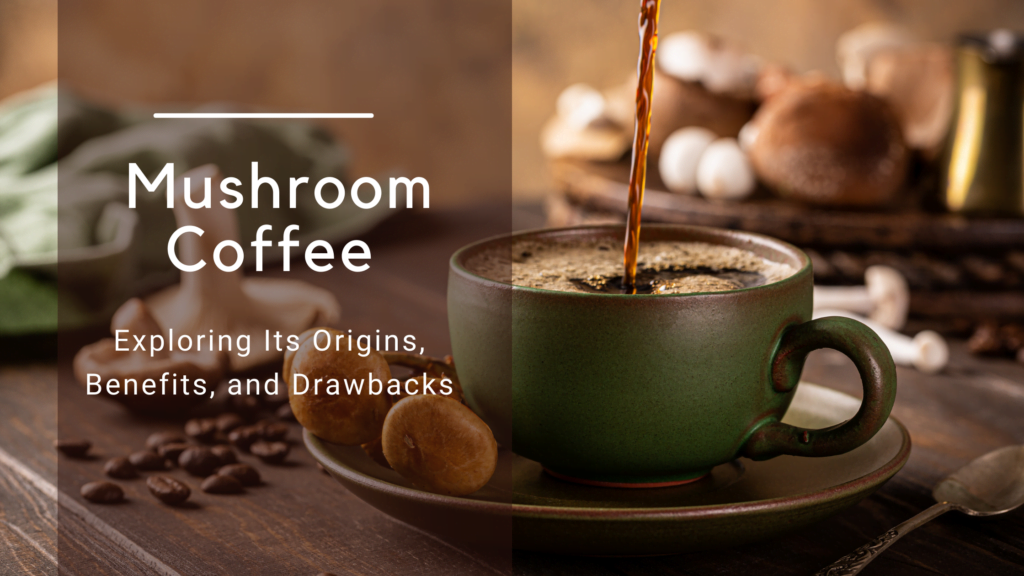
During World War II, the use of mushrooms in coffee emerged as a creative solution to coffee shortages experienced in various parts of the world, particularly in Finland. The scarcity of coffee beans, due to the challenges of wartime logistics and prioritization of resources for military use, led to the exploration of alternative substances that could mimic the taste and experience of coffee.
In Finland, the chaga mushroom, native to the country, was utilized as a coffee substitute. Finnish people began making mushroom coffee by soaking chaga in water overnight and pressing out the liquid, which could then be boiled alone or mixed with bits of real coffee for flavor.
This practice was not only a response to the shortage of coffee but also provided a boost of nutrients, leveraging the health benefits associated with chaga mushrooms. The concept of mushroom coffee, therefore, has its roots in the wartime innovation of the Finnish people, aiming to address the scarcity while also tapping into the nutritional value of local natural resources.
Emergence of mushroom coffee as a trendy alternative
Fast forward to today, and mushroom coffee has shed its substitute status. Now, it’s a trendy beverage formulated with specific, health-promoting mushrooms. These aren’t your run-of-the-mill grocery store white button mushrooms, but rather adaptogenic varieties like lion’s mane, chaga, and reishi, each boasting potential health benefits.
So, what’s the big deal? Proponents of mushroom coffee claim it offers a range of advantages over regular coffee, from boosting cognitive function and immunity to reducing stress and inflammation. Whether these claims hold weight is what we’ll delve into throughout this blog post. We’ll explore the science behind the ingredients, the taste experience, and the potential drawbacks of this new take on coffee. Buckle up, and get ready to learn all about the world of mushroom coffee!
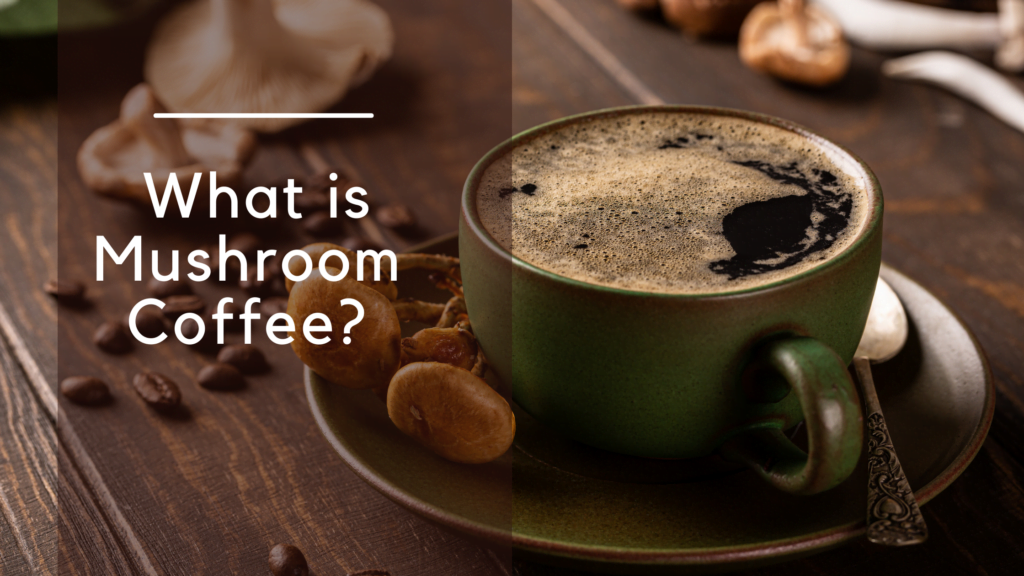
What is Mushroom Coffee?
Description of mushroom coffee blend
Understanding Mushroom Coffee Blends
Mushroom coffee isn’t simply coffee with chunks of mushrooms thrown in. Rather, it’s created in two main ways:
- Ground Blend: Finely ground coffee beans mixed with powdered medicinal mushroom extracts. This is the most common form.
- Instant Packets: Pre-portioned mixes of instant coffee and mushroom extracts ready for hot water.
Typical Mushroom Ingredients
| Mushroom | Benefits |
|---|---|
| Reishi | Known for potential sleep improvement and relaxation benefits. |
| Chaga | Packed with antioxidants, may support immune function. |
| Lion’s Mane | Potentially enhances memory, focus, and cognitive health. |
| Cordyceps | Might boost energy and athletic performance. |
| Turkey Tail | Could have immune-boosting properties. |
The Flavor Factor
- Taste: Mushroom coffee has a noticeably earthy flavor profile, complementing the natural bitterness of coffee. It’s often described as smoother and less acidic than regular coffee.
- Additional Ingredients: Many blends incorporate other adaptogens like ashwagandha, and spices like cinnamon or cacao for a more complex flavor experience.
Important Note: The flavor and overall effect of mushroom coffee depend heavily on the specific types of mushrooms used, their quality, and the proportions within the blend.
Common types of medicinal mushrooms used
Here’s a breakdown of some of the most common medicinal mushrooms used in coffee blends and other wellness products:
| Mushroom | Scientific Name | Benefits |
|---|---|---|
| Reishi | Ganoderma lucidum | The “mushroom of immortality,” revered for its potential calming effects, stress reduction, and potential sleep benefits. |
| Lion’s Mane | Hericium erinaceus | Prized for its potential to enhance cognition, memory, and focus. It might support nerve health and regeneration. |
| Chaga | Inonotus obliquus | A powerful antioxidant source, Chaga is believed to boost the immune system and support overall health. |
| Cordyceps | Ophiocordyceps sinensis | A potential energy and performance booster, Cordyceps is often used by athletes and those seeking to increase stamina. |
| Turkey Tail | Trametes versicolor | Offers potential immune-modulating properties and could have beneficial effects in supporting gut health. |
| Maitake | Grifola frondosa | May help manage blood sugar levels and support metabolic health. |
| Shiitake | Lentinula edodes | This culinary mushroom also possesses potential immune-supporting properties and may help with cholesterol management. |
Important to Note:
- Adaptogens: Many of these mushrooms are classified as adaptogens, meaning they may help the body manage stress more effectively.
- Scientific Research: While traditional use and emerging studies suggest potential benefits, more extensive research is still needed to fully understand the effects and safety of many medicinal mushrooms.
- Consultation: It’s always wise to consult a healthcare professional before starting any new supplement, especially if you have underlying health conditions or take medications.
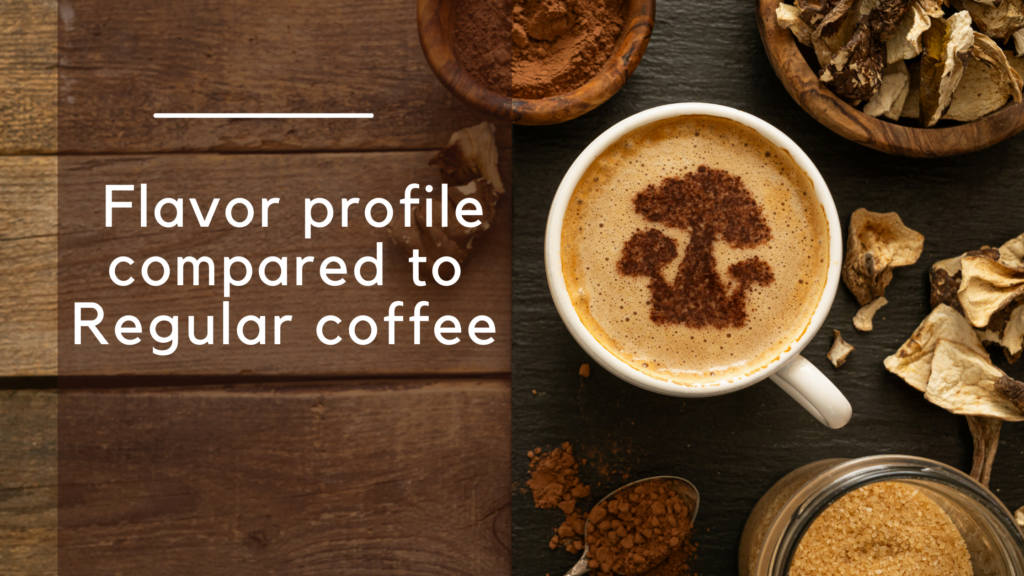
Flavor profile compared to regular coffee
Here’s a breakdown of the flavor profile of mushroom coffee compared to regular coffee:
Regular Coffee:
- Dominant Flavors: Bitter, acidic, often with notes of roasted nuts, chocolate, or fruit depending on the bean origin and roast.
- Aroma: Rich, roasted, sometimes smoky and slightly sweet.
- Body: Can range from light and tea-like to full-bodied and syrupy.
Mushroom Coffee:
- Earthy Undertones: The most noticeable difference is the addition of earthy, umami flavors from the mushrooms. This isn’t an overpowering mushroom taste like you’d find in a sauté, but a subtle complexity.
- Less Acidity: Many people find mushroom coffee smoother and less acidic than regular coffee, making it gentler on the stomach.
- Variations: The specific mushroom(s) used, their proportions, and the type of coffee bean all influence the final flavor. Some blends might feature hints of spice or sweetness from added ingredients like cinnamon or cacao.
Overall Impression:
Think of mushroom coffee as a deeper, more complex cousin of regular coffee. The core coffee flavor is still there, but it’s layered with an earthy richness that some find quite appealing.
Here are some common descriptions of mushroom coffees’ flavor:
- “Nutty”
- “Woodsy”
- “Mellow”
- “Smooth”

Crafting Mushroom Coffee
Extraction process of medicinal mushrooms
The extraction process of medicinal mushrooms for crafting mushroom coffee involves a meticulous approach to maximize the potency and benefits of the mushrooms. The process typically includes a dual extraction method using both hot water and alcohol to extract distinct compounds from the mushrooms.
Here is a detailed overview of the extraction process based on the provided sources:
Preparation of Mushroom Material:
- Freshly grown mushrooms are harvested and dried in a dehydrator at around 40°C.
- The dried mushrooms are then ground into a powder, ready for the extraction process.
- For mycelium extracts, the mycelium is grown on sterilized Rye grain until fully colonized, then dried and powdered.
Hot Water Extraction:
- Hot water extraction is a traditional method commonly used for mushroom extraction.
- Jars are filled with mushroom material and water, then soaked in a hot water bath for around 12 hours at temperatures between 70-80°C.
- This process extracts water-soluble compounds like B-glucans without damaging the mushroom material.
Alcohol Extraction:
- Alcohol extraction involves covering dried mushroom material with alcohol in a mason jar and storing it in a warm, dark room for 4-6 weeks.
- Regular shaking of the mixture helps in the extraction process.
- The alcohol is evaporated off using a dehydrator, leaving behind a dried powder rich in alcohol-soluble beneficial compounds.
Dual Extraction:
- Dual extraction combines both hot water and alcohol extracts in a 50:50 ratio to create a full-spectrum functional mushroom extract powder.
- This dual extract method ensures that both water-soluble and non-water-soluble compounds are captured for maximum health benefits.
Final Product:
- The extracted powders from both methods are combined to create a potent mushroom extract powder.
- This powder can be encapsulated for easy consumption, providing high-strength mushroom extract with maximum freshness and bioavailability.
The dual extraction process is crucial for ensuring that all beneficial compounds from the medicinal mushrooms are effectively extracted, providing a comprehensive blend of nutrients and health benefits in mushroom coffee products
Preparation steps: dehydrating, grinding, and blending
To craft mushroom coffee, you can follow these preparation steps: dehydrating, grinding, and blending the mushrooms.
Here’s a concise guide based on the information from the provided sources:
| Step | Description |
|---|---|
| Dehydrating the Mushrooms | Begin by dehydrating your chosen mushrooms. Popular options include Chaga, Lion’s Mane, Reishi, and Turkey Tail. Dehydrate the mushrooms until they are completely dried out. |
| Grinding the Dehydrated Mushrooms | Once the mushrooms are dehydrated, grind them into a fine powder using a food processor or spice grinder. Ensure that the powder is finely ground to achieve a smooth consistency in your coffee. |
| Blending the Mushroom Powder | Combine the ground mushroom powder with your favorite ground coffee beans in the desired ratio. Mix them well to create a blend that suits your taste preferences. |
By following these steps of dehydrating, grinding, and blending the mushrooms with coffee beans, you can create your own customized mushroom coffee blend at home
Available forms: instant packets, ground blends, and coffee pods
Crafting mushroom coffee can be done using various forms such as instant packets, ground blends, and coffee pods. These different forms offer convenience and flexibility in preparing mushroom-infused coffee to suit individual preferences.
- Instant Packets: Mushroom coffee instant packets are a quick and easy way to enjoy this unique beverage. These packets typically contain a blend of powdered dried mushroom extract and coffee beans. To craft mushroom coffee using instant packets, simply mix the contents of the packet with hot water, following the specific instructions provided on the packaging. This form is ideal for those looking for a convenient option without compromising on taste or health benefits.
- Ground Blends: Ground blends of mushroom coffee involve combining ground coffee beans with powdered adaptogenic mushrooms like reishi, cordyceps, chaga, turkey tail, or lion’s mane. Crafting mushroom coffee with ground blends requires brewing the mixture similar to traditional coffee-making methods. The earthy taste of the mushrooms adds depth to the flavor profile of the coffee, offering a satisfying drinking experience enriched with additional nutrients and potential health benefits.
- Coffee Pods: Mushroom coffee pods are another convenient option for preparing this unique beverage. These pods are compatible with various single-serve coffee machines like Keurig. To craft mushroom coffee using pods, simply insert the pod into the machine and follow the brewing instructions specific to your device. This form provides a hassle-free way to enjoy mushroom-infused coffee without the need for measuring or grinding ingredients.

Lower Caffeine Content
Comparison of caffeine content between mushroom coffee and regular/decaffeinated coffee
Here’s a comparison of the caffeine content in mushroom coffee, regular coffee, and decaffeinated coffee:
Mushroom Coffee: Mushroom coffee, also known as “mushroom blends” or “functional coffee blends,” is made by combining regular coffee grounds with extracts or powders derived from various mushroom species, such as lion’s mane, chaga, reishi, or cordyceps. The amount of caffeine in mushroom coffee can vary depending on the ratio of regular coffee to mushroom extracts, but it typically contains less caffeine than a regular cup of coffee.
Regular Coffee:
- An 8-ounce (240 ml) cup of brewed coffee from ground beans contains approximately 95 milligrams of caffeine.
- The caffeine content can range from 65 mg to 165 mg per 8-ounce cup, depending on factors such as the type of coffee bean, roast level, and brewing method.
Decaffeinated Coffee:
- An 8-ounce (240 ml) cup of brewed decaffeinated coffee contains around 2-4 milligrams of caffeine.
- The decaffeination process removes most of the caffeine (97-99%) from the coffee beans, but a small amount of caffeine (about 0.1-0.3%) may remain.
Implications for individuals sensitive to caffeine
For individuals who are sensitive to caffeine, the caffeine content in mushroom coffee and decaffeinated coffee may be preferable options compared to regular coffee. Here are some implications to consider:
Mushroom Coffee:
- Since mushroom coffee blends contain less caffeine than regular coffee, they may be a better choice for those who want to reduce their caffeine intake but still enjoy the flavor and ritual of drinking coffee.
- However, the exact caffeine content can vary depending on the brand and ratio of mushroom extracts to regular coffee grounds. It’s important to check the labeling or contact the manufacturer for specific caffeine levels.
- Some individuals may still find the caffeine content in mushroom coffee too high if they are highly sensitive to caffeine.
Decaffeinated Coffee:
- Decaffeinated coffee is an excellent option for those who are highly sensitive to caffeine or need to avoid it altogether due to medical reasons or personal preferences.
- With only trace amounts of caffeine (2-4 mg per 8-ounce cup), decaffeinated coffee is unlikely to cause the jittery, anxious, or other adverse effects that some people experience with regular coffee.
- It’s important to note that while most of the caffeine is removed, decaffeinated coffee still contains small amounts, so those with extreme caffeine sensitivity may need to avoid it completely.
Both mushroom coffee and decaffeinated coffee can be viable alternatives for individuals sensitive to caffeine, with decaffeinated coffee being the lowest in caffeine content. However, it’s essential to check the labeling and be aware of potential residual caffeine levels, as individual sensitivity can vary greatly.
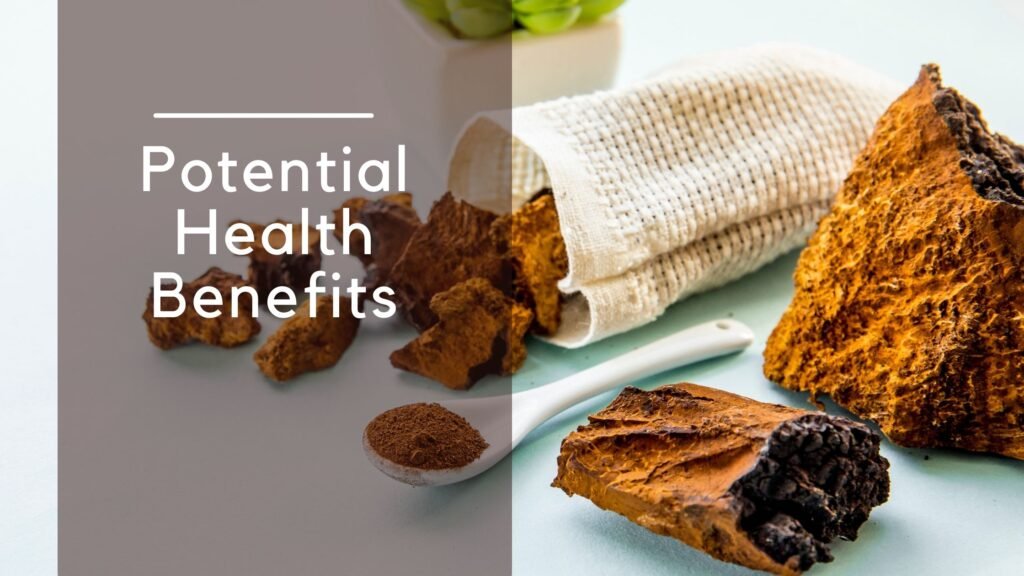
Potential Health Benefits
Traditional use of medicinal mushrooms in Chinese medicine
Medicinal mushrooms have been used in traditional Chinese medicine (TCM) for centuries, valued for their perceived health-promoting properties. Here are some of the traditional uses of medicinal mushrooms in Chinese medicine:
Reishi (Ganoderma lucidum):
- Believed to promote longevity and enhance overall well-being.
- Used to support the immune system, improve respiratory health, and reduce stress and fatigue.
- Considered a tonic for the heart and liver.
Cordyceps (Cordyceps sinensis):
- Traditionally used to replenish energy and promote vitality.
- Believed to nourish the lungs and kidneys.
- Used to enhance athletic performance and endurance.
Shiitake (Lentinula edodes):
- Valued for its potential to support cardiovascular health and promote blood circulation.
- Believed to have anti-inflammatory properties and support the immune system.
Maitake (Grifola frondosa):
- Traditionally used to support the immune system and promote overall health.
- Believed to have potential benefits for blood sugar regulation.
Turkey Tail (Trametes versicolor):
- Used to enhance the body’s resistance and support the immune system.
- Believed to have potential benefits for digestive health.
Chaga (Inonotus obliquus):
- Traditionally used as a tonic for overall well-being and longevity.
- Believed to have antioxidant properties and support the immune system.
In TCM, these mushrooms are often used in combination with other herbs and ingredients, as part of a holistic approach to maintaining balance and promoting overall health. They are typically consumed as teas, tinctures, or powders, and are believed to have a wide range of potential therapeutic applications.
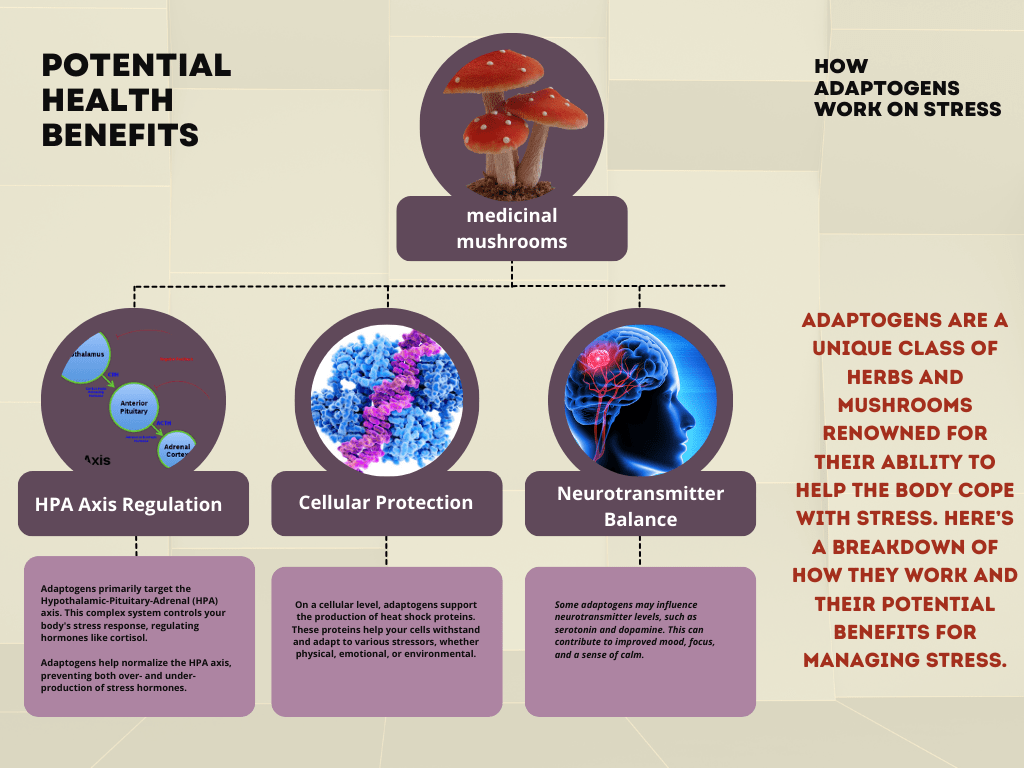
Adaptogens are a unique class of herbs and mushrooms renowned for their ability to help the body cope with stress. Here’s a breakdown of how they work and their potential benefits for managing stress:
How Adaptogens Work on Stress
HPA Axis Regulation: Adaptogens primarily target the Hypothalamic-Pituitary-Adrenal (HPA) axis. This complex system controls your body’s stress response, regulating hormones like cortisol. Adaptogens help normalize the HPA axis, preventing both over- and under-production of stress hormones.
Cellular Protection: On a cellular level, adaptogens support the production of heat shock proteins. These proteins help your cells withstand and adapt to various stressors, whether physical, emotional, or environmental.
Neurotransmitter Balance: Some adaptogens may influence neurotransmitter levels, such as serotonin and dopamine. This can contribute to improved mood, focus, and a sense of calm.
Potential Stress-Response Benefits of Adaptogens
- Reduced Stress & Anxiety: Adaptogens help you become more resilient to stress, reducing feelings of overwhelm and anxiety.
- Improved Mental Clarity: They may promote focus, concentration, and a clearer head even during stressful periods.
- Enhanced Energy Levels: While balancing stress hormones, adaptogens can support healthy, sustained energy without the jitters or crash associated with caffeine.
- Better Sleep: By regulating cortisol, some adaptogens may promote more restful sleep patterns.
Common Adaptogenic Herbs and Mushrooms
- Ashwagandha
- Rhodiola Rosea
- Holy Basil (Tulsi)
- Eleuthero (Siberian Ginseng)
- Reishi Mushroom
- Lion’s Mane Mushroom
- Cordyceps Mushroom
Important Considerations:
- Not a Quick Fix: Adaptogens work best when taken consistently over time. Don’t expect immediate stress relief like you might with an anti-anxiety medication.
- Research is Ongoing: While traditional use and studies are promising, more research is required to fully understand the long-term effects and optimal dosing of many adaptogens.
- Individualized Response: Adaptogens can affect people differently. Monitor your body’s response and work with a healthcare professional to personalize your approach if needed.
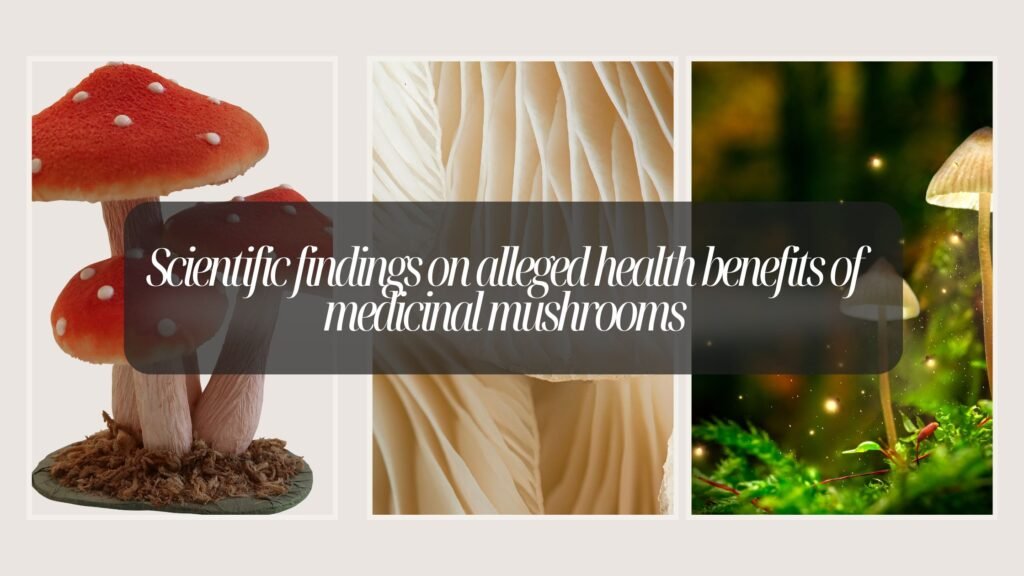
Scientific findings on alleged health benefits of medicinal mushrooms
Improved immunity
While the research on the immune-boosting effects of medicinal mushrooms is promising, it’s important to understand the nuances:
Potential Benefits:
- Increased Immune Cell Activity: Studies suggest that certain medicinal mushrooms, like reishi, shiitake, and turkey tail, can stimulate the activity of various immune cells like macrophages, natural killer cells, and T-cells. This enhanced activity might help the body better recognize and fight off infections.
- Antioxidant and Anti-inflammatory Properties: Many medicinal mushrooms are rich in antioxidants and compounds like beta-glucans, which can help reduce inflammation. Chronic inflammation weakens the immune system, so controlling it is crucial for overall immune health.
- Gut Health Support: Emerging research points to the potential role of medicinal mushrooms in supporting a healthy gut microbiome. Since a significant portion of the immune system resides in the gut, a balanced microbiome is essential for strong immunity.
Important Considerations:
- Most Studies are Preliminary: Much of the existing research on medicinal mushrooms and immunity has been conducted in test tubes or on animals. More robust human clinical trials are needed to confirm and quantify the effects.
- Specificity Matters: Different mushrooms have varying compositions and may offer different benefits. Some might be more focused on antioxidant action, while others might primarily stimulate immune cell response.
- Not a Cure-All: While potentially supportive, medicinal mushrooms should not be considered a replacement for healthy lifestyle habits like good nutrition, exercise, and sleep, which are all fundamental to a strong immune system.
Where the Research Stands:
The potential of medicinal mushrooms for immune health is exciting, but it’s still an area of active research. Current findings suggest promise, but we need a larger body of well-designed human studies to fully understand the extent and specific mechanisms of these benefits.
Potential cancer prevention
The potential for medicinal mushrooms to play a role in cancer prevention is an area of active research. While promising, it’s important to understand the current state of the science:
Potential Mechanisms:
- Immune Boosting: Many medicinal mushrooms contain polysaccharides (complex sugars) like beta-glucans, which can stimulate the immune system. A robust immune system can better identify and combat potentially cancerous cells.
- Antioxidant Power: Mushrooms like Chaga and Reishi are rich in antioxidants, which fight cell damage caused by free radicals. Chronic oxidative stress can contribute to cancer development.
- Anti-Inflammatory Effects: Chronic inflammation can promote an environment conducive to cancer. Some mushrooms may help reduce inflammation in the body.
- Direct Anti-Tumor Activity: Certain compounds in mushrooms might directly inhibit the growth of cancer cells or interfere with their development, but more research is needed in this area.
Specific Studies:
- Lab and Animal Research: Promising lab studies and animal models show certain mushroom extracts might suppress tumor growth, induce cancer cell death, and enhance the effects of conventional cancer therapies.
- Human Observational Studies: Some observational studies suggest links between higher consumption of certain mushrooms and lower risks of specific cancers. However, observational studies can’t prove direct cause and effect.
- Clinical Trials: While some early-stage clinical trials are investigating the use of mushroom extracts alongside conventional cancer treatment, more robust human research is needed.
Important Considerations:
- Not a Cure: It’s crucial to emphasize that mushrooms should never be considered a standalone cancer treatment or a replacement for conventional therapies.
- Supportive Role: The current research hints at a potential supportive role for specific mushrooms in enhancing immunity and possibly reducing side effects of chemotherapy and radiation.
- Quality Matters: The type of mushroom, extraction method, preparation, and dosage are all key factors influencing potential benefits.
- Consultation is Key: If you’re considering supplementing with medicinal mushrooms, especially alongside cancer treatment, it’s critical to consult with your oncologist.
The Future is Promising:
The research on medicinal mushrooms and cancer prevention is ongoing and shows potential. However, larger-scale human studies are needed to fully understand their role and determine safe and effective dosage guidelines.
Antiulcer and anti-allergenic properties
The research into medicinal mushrooms for antiulcer and anti-allergenic properties is ongoing and shows some promising results, though more studies are needed to draw definitive conclusions. Here’s a breakdown of what we know so far:
Antiulcer Properties
Potential Mechanisms: Some studies suggest that medicinal mushrooms may protect against ulcers through several actions:
- Antioxidant and Anti-inflammatory Effects: Mushrooms contain compounds that can help scavenge free radicals and reduce inflammation, both of which play a role in ulcer formation.
- Boosting Protective Mucus: Certain mushrooms might stimulate the production of mucus that lines the stomach, providing a barrier against stomach acid.
- Reducing H.pylori Bacteria: Some research indicates mushrooms could have antibacterial properties against H. pylori, a common bacteria linked to ulcers.
Specific Mushrooms: Studies have focused on mushrooms like:
- Ganoderma lucidum (Reishi)
- Agaricus blazei
- Hericium erinaceus (Lion’s Mane)
Research Status: While these studies provide a foundation, larger-scale human trials are needed to confirm the efficacy and safety of mushrooms in preventing and treating ulcers.
Anti-allergenic Properties
Modulating Immune Responses: Medicinal mushrooms may help to modulate the immune system, potentially reducing overactive responses that trigger allergies.
Specific Actions: Research suggests potential benefits involving:
- Reducing histamine release (a key chemical in allergic reactions).
- Suppressing inflammatory pathways linked to allergies.
- Supporting gut health, as an imbalanced gut microbiome can contribute to allergies.
Mushrooms to Watch: Studies show promise with:
- Ganoderma lucidum (Reishi)
- Cordyceps sinensis
Research Status: Similar to antiulcer research, more extensive human studies are needed to fully understand these effects and determine how mushrooms might be effectively used to manage allergies.
Important Considerations:
- Not a Substitute for Medical Treatment: While showing promise, medicinal mushrooms should not replace prescribed medications for ulcers or allergies. Always consult your doctor before making changes to your treatment plan.
- Quality Matters: The quality and source of medicinal mushroom supplements affect the concentration of active compounds; thus results can vary.
- Potential Side Effects: Some people may experience mild digestive discomfort or other side effects with some medicinal mushrooms.
The Bottom Line: Research on the antiulcer and anti-allergenic properties of medicinal mushrooms is encouraging. However, it’s still in its relatively early stages. If you’re interested in exploring these potential benefits, talk to your doctor for personalized guidance.
Cardiovascular benefits
While traditional medicine has long revered medicinal mushrooms, scientific research on their specific cardiovascular benefits is still evolving. Here’s a breakdown of potential positive effects and the current state of the science:
Potential Cardiovascular Benefits of Medicinal Mushrooms
| Health Benefit | Mushrooms | Explanation |
|---|---|---|
| Blood Pressure Management | Reishi, Maitake | Some studies suggest mushrooms like Reishi and Maitake could have a mild blood pressure-lowering effect, potentially due to compounds that relax blood vessels. |
| Cholesterol Regulation | Shiitake, Reishi | Certain mushrooms, including Shiitake and Reishi, contain compounds like beta-glucans and ergosterol that may help lower LDL (“bad”) cholesterol levels and improve overall cholesterol profiles. |
| Antioxidant & Anti-inflammatory Effects | Various | Many medicinal mushrooms are packed with antioxidants, which could combat inflammation and oxidative stress linked to heart disease. |
| Blood Sugar Regulation | Maitake | Mushrooms like Maitake might have potential in improving insulin sensitivity and blood sugar management, which has indirect benefits for cardiovascular health. |
The State of the Science
| Promising but Preliminary | Many of the findings stem from animal studies or small-scale human trials. Larger, long-term clinical studies are needed to fully validate these potential benefits and establish safe and effective dosages. |
|---|---|
| Not a Cure-All | Medicinal mushrooms are best considered a supportive tool for healthy cardiovascular function, combined with a heart-healthy diet, exercise, and other lifestyle modifications. |
| Potential Interactions | Always consult a doctor before incorporating medicinal mushrooms, especially if you’re taking medications for cardiovascular conditions. Some mushrooms might interact with certain drugs. |
Important Notes:
- Focus on Whole Mushrooms: Most research centers around extracts or powdered forms of whole mushrooms, not just adding a few button mushrooms to your pasta.
- Quality Matters: Choose reputable mushroom supplements with standardized amounts of active compounds for consistency and safety.
It’s exciting to see more research focusing on the cardiovascular potential of medicinal mushrooms. Still, it’s vital to manage expectations and approach these natural remedies with a healthy dose of scientific skepticism until more robust evidence is available.
Downsides of Mushroom Coffee
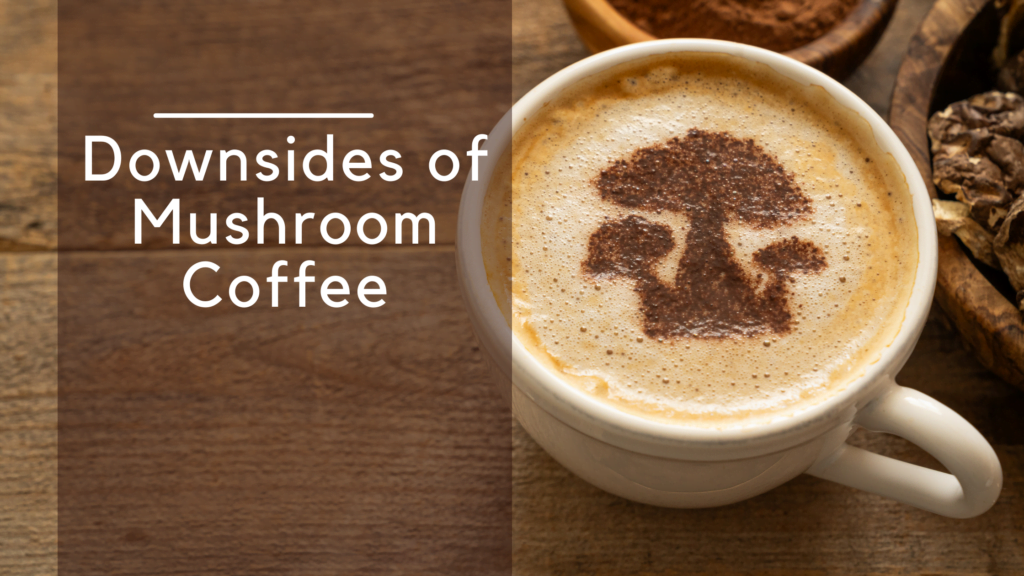
Lack of human studies on health effects
- Limited Human Research:
- Most Supporting Evidence: Currently, most of the research supporting the potential benefits of medicinal mushrooms has been conducted in test tubes, animals, or in small-scale human studies.
- Lack of Long-term Data: We lack extensive long-term human studies to fully understand the safety, optimal dosage, and potential side effects of consuming mushroom coffee regularly.
- Specific Blends: Research often focuses on isolated mushroom extracts, not the multi-mushroom blends common in commercial mushroom coffee. This leaves questions about how these extracts interact and their overall cumulative effect on the body.
- Potential for Hype & Misinformation:
- Trendy Market: The popularity of mushroom coffee has led to an inundation of products and marketing claims that may outpace the actual scientific evidence.
- Exaggerated Benefits: Some brands make sweeping health claims about their mushroom coffee that aren’t fully substantiated by robust research.
- Individual Variances & Safety Considerations:
- Reactions: Not everyone may respond the same way to medicinal mushrooms. Some individuals may experience mild digestive upset or sensitivities.
- Drug Interactions: There’s the potential for interactions between certain mushroom compounds and medications. Consultation with a healthcare professional is essential, especially if you take regular medications.
- Allergies: While uncommon, allergies to specific mushrooms are possible.
- Pregnancy & Breastfeeding: There’s insufficient safety data on the use of mushroom coffee during pregnancy or breastfeeding.
- Cost & Accessibility:
- Pricey: Mushroom coffee blends are generally more expensive than regular coffee.
- Sourcing: Finding high-quality mushroom coffee products with transparent ingredient sourcing can be a challenge.
Important Takeaway:
It’s exciting to see the potential benefits of medicinal mushrooms being explored. However, mushroom coffee shouldn’t be viewed as a miracle cure-all. Approach it with a healthy dose of skepticism, especially if you have underlying health conditions or take medications. A conversation with a knowledgeable healthcare provider is always advisable before trying new supplements.
Safety concerns regarding dosage, interactions, and effectiveness

Safety Concerns
Dosage:
- No standard dosages: Recommended dosages for many medicinal mushrooms aren’t clearly established, especially when consumed as a part of a coffee blend.
- Overconsumption risk: Consuming too much of certain mushrooms could lead to digestive upset or other potential side effects.
Interactions:
- Medication interactions: Some medicinal mushrooms may interact with certain medications, including blood thinners or drugs metabolized by the liver. Consultation with a healthcare professional is crucial if you’re taking any medications.
- Caffeine interactions: Even though mushroom coffee has less caffeine than regular coffee, there could still be interactions for those particularly sensitive to caffeine.
Effectiveness:
- Hype vs. reality: Be wary of overblown health claims surrounding mushroom coffee. The scientific support for many of these claims is either limited or requires further investigation.
- Individual variation: People may react differently to medicinal mushrooms, and not everyone will experience the purported benefits.
Additional Considerations
- Pregnancy and breastfeeding: It’s best to avoid mushroom coffee during pregnancy and breastfeeding due to a lack of safety data.
- Mushroom quality & sourcing: Opt for reputable brands that use high-quality, organically grown mushrooms and provide transparent information about ingredients and dosages.
- Allergies: If you have a known mushroom allergy, mushroom coffee is not for you.
Always Remember:
- Start slow: Begin with a lower dose and monitor your body’s response before increasing consumption.
- Listen to your body: Pay attention to any digestive discomfort, changes in sleep patterns, or other unusual reactions.
- Doctor consultation: It’s paramount to consult with your doctor before introducing mushroom coffee into your routine, especially if you have any underlying health conditions or take medications.
Higher cost compared to regular coffee
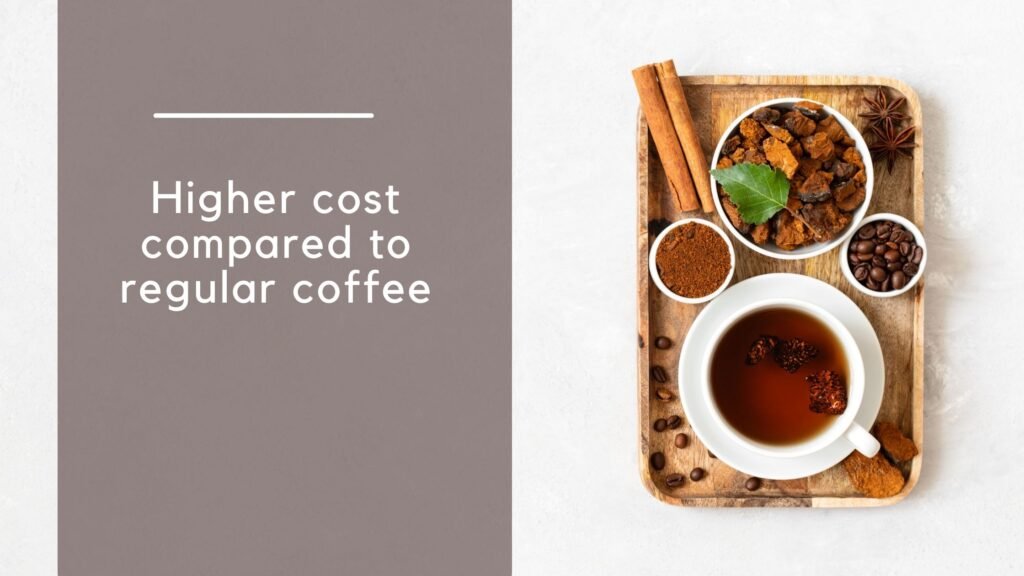
- Ingredient Sourcing: Medicinal mushrooms often require specific growing conditions and are not as widely cultivated as conventional coffee beans. This makes them more labor-intensive to produce and source.
- Extraction Processes: Isolating and concentrating the beneficial compounds (like beta-glucans and other polysaccharides) from medicinal mushrooms requires specialized extraction methods, adding to the production cost.
- Smaller Market: Mushroom coffee is a niche product compared to regular coffee. The smaller market size means less economy of scale, contributing to its higher price point.
- Marketing and Branding: As a trendy wellness product, mushroom coffee often carries premium branding and marketing, which also influences the price.
How Much More Expensive?
The price difference can be substantial. A typical bag of mushroom coffee can easily cost double or even triple the price of a similar-sized bag of regular coffee.
Is it Worth the Cost?
Whether or not the higher price is justified depends on several factors:
- Health Goals: If you’re seeking specific potential health benefits of adaptogens and medicinal mushrooms, and find value in those, the cost might be more justifiable.
- Budget: If you’re on a tighter budget, mushroom coffee might not be a sustainable everyday choice.
- Taste Preference: If you genuinely enjoy the taste of mushroom coffee, the premium price might be easier to tolerate.
- Alternative Options: Consider experimenting with adding powdered medicinal mushrooms to your regular coffee for a more budget-friendly DIY approach.
Bottom Line
Mushroom coffee is a blend of regular coffee with powders or extracts derived from various medicinal mushrooms like reishi, chaga, lion’s mane, and cordyceps. It aims to combine the potential health benefits associated with these adaptogenic mushrooms and the familiar experience of drinking coffee.
While some preliminary research hints at possible advantages such as enhanced immunity, cognitive function, and reduced inflammation, the majority of evidence comes from test-tube or animal studies. Extensive human clinical trials are still lacking to conclusively validate most of the health claims surrounding mushroom coffee products.
It’s important to approach mushroom coffee and its purported benefits with a healthy dose of skepticism. Many of the marketing claims may be exaggerated or lack substantial scientific backing at this stage. The effects can also vary significantly between individuals based on factors like the specific mushroom blend, quality of ingredients, and personal physiology.
Before incorporating mushroom coffee into your routine, especially if you have any underlying health conditions or take medications, it is highly recommended to consult with a qualified healthcare provider. They can guide you on potential risks, drug interactions, and whether mushroom coffee aligns with your specific health goals and needs.
While the concept of mushroom coffee is intriguing, more robust research is necessary to establish its true efficacy, optimal dosages, and long-term safety profile. An open dialogue with professionals in the field can help separate hype from reality regarding this emerging trend.
Conclusion
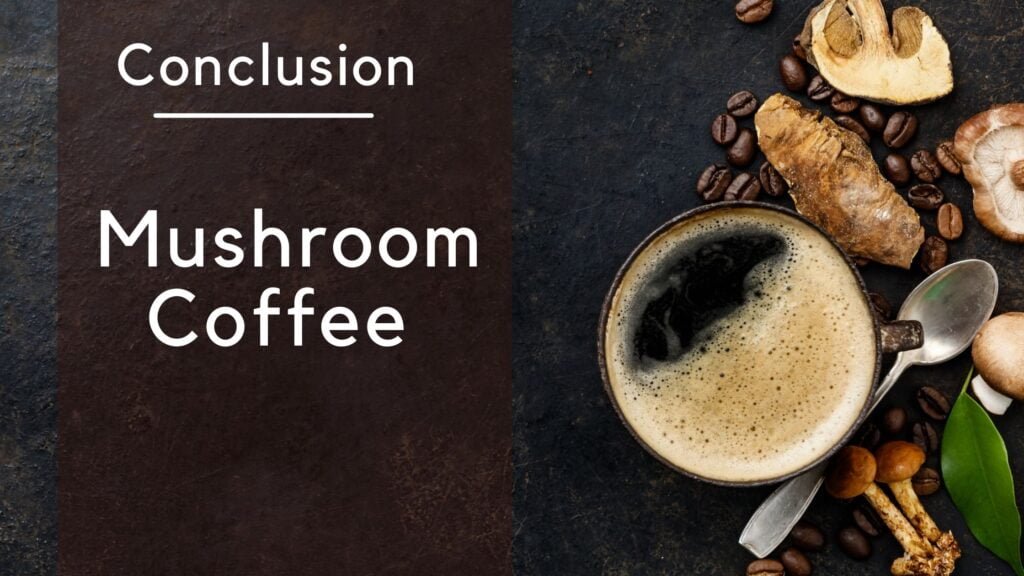
Mushroom coffee has emerged as a curious and intriguing trend, blending the beloved ritual of coffee consumption with the potential health-promoting properties of medicinal mushrooms. By incorporating extracts from adaptogens like reishi, chaga, lion’s mane, and cordyceps into conventional coffee blends, proponents suggest mushroom coffee may offer a range of benefits, from boosting immunity and cognitive function to reducing inflammation and stress.
However, as we’ve explored, the majority of the evidence supporting these claims currently stems from preliminary research conducted in test tubes or on animals. While promising, extensive human clinical trials are still lacking to conclusively validate the purported advantages and establish safe, effective dosages for regular consumption.
It’s crucial to approach mushroom coffee and its marketing claims with a critical eye, as the hype may sometimes outpace the actual scientific findings. The effects can vary significantly between individuals based on factors like the specific mushroom blend, ingredient quality, and personal physiology.
As research in this area continues to evolve, it’s essential to acknowledge that our understanding of the full potential and limitations of mushroom coffee is still in its infancy. New studies may uncover additional insights or challenge existing assumptions, shaping our perception of this unique beverage.
For those interested in exploring mushroom coffee, it is strongly encouraged to make informed decisions by consulting with qualified healthcare professionals, particularly if you have any underlying health conditions or take medications. These experts can provide personalized guidance, considering your specific circumstances and goals, and help navigate any potential risks or interactions.
While the concept of mushroom coffee is undoubtedly intriguing, it’s crucial to approach it with a balanced perspective, separating hype from reality and prioritizing scientifically-backed information. As the research in this field progresses, we can look forward to a deeper understanding of the true potential and appropriate applications of this fascinating fusion of coffee and medicinal mushrooms.
FAQs
Q) What is mushroom coffee?
Mushroom coffee is a blend of regular coffee grounds with extracts or powders derived from various medicinal mushrooms, such as reishi, chaga, lion’s mane, and cordyceps.
Q) What are the potential benefits of drinking mushroom coffee?
Proponents claim that mushroom coffee may offer benefits like boosting immunity, enhancing cognitive function, reducing inflammation, and promoting overall well-being due to the potential properties of the mushrooms used.
Q) How does the caffeine content of mushroom coffee compare to regular coffee?
Mushroom coffee typically contains less caffeine than a regular cup of coffee, as the addition of mushroom extracts reduces the overall proportion of coffee grounds.
Q)What does mushroom coffee taste like?
Mushroom coffee is often described as having an earthy, umami flavor profile that complements the bitterness of regular coffee. Some find it smoother and less acidic than traditional coffee.
Q) Are there any potential downsides or safety concerns with mushroom coffee?
While generally considered safe, there are limited long-term human studies on the effects of consuming mushroom coffee regularly. It’s essential to consult with a healthcare professional, especially if you have underlying health conditions or take medications, as some mushrooms may interact with certain drugs.
Q) How is mushroom coffee prepared?
Mushroom coffee can be found in various forms, including ground blends, instant packets, and coffee pods, and is typically brewed like regular coffee.
Q) Is mushroom coffee more expensive than regular coffee?
Yes, mushroom coffee blends tend to be more expensive than regular coffee due to the additional cost of sourcing and processing the medicinal mushrooms.
Q) Where can I purchase high-quality mushroom coffee?
Look for reputable brands that use organically grown mushrooms and provide transparent information about their ingredients and sourcing. Health food stores and online retailers specializing in functional foods often carry a selection of mushroom coffee products.
